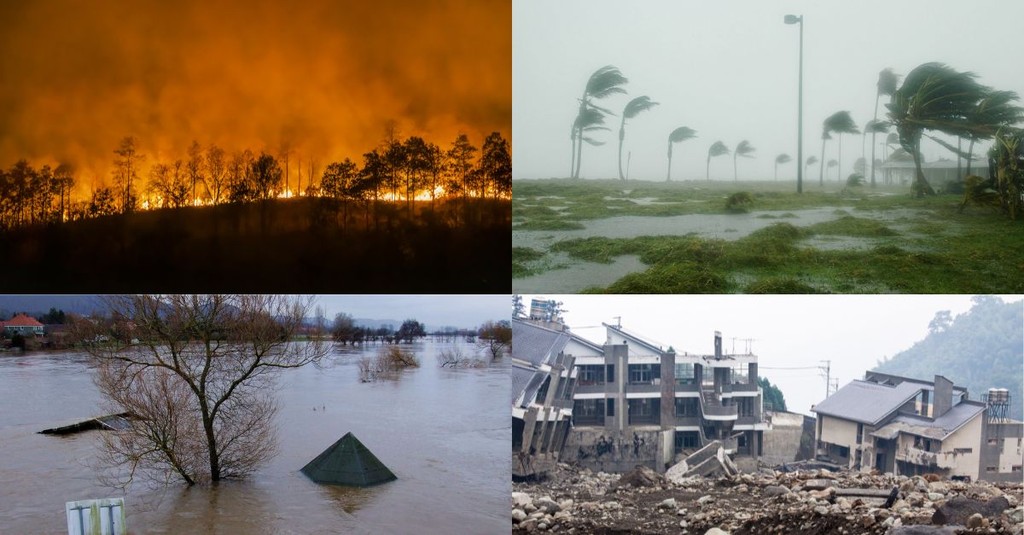
I spent the afternoon helping my son type up an essay on Pompeii. If you aren’t familiar with it, it's a town that was completely annihilated one day by the sudden eruption of the volcano situated right behind this city. As we talked through this tragedy, it dawned on me that things haven’t changed much; then and now, much of our world experiences momentary trauma and loss due to natural disasters and calamity.
Nowadays, with the 24-hour news cycle, we are also so keenly aware of how often our Earth shifts and groans frequently at the peril of its human inhabitants. Almost daily, it seems we read about unexpected forces that seemingly swallow up man's work without a second thought. If you pay too much attention to the headlines, it's truly unnerving because any illusion of control or security we may be holding on is quickly shaken when we start paying attention.
As followers of Christ, we must find a way to reconcile God’s goodness with the tumultuous nature of his creation. A faith that overlooks our suffering is wishful thinking and, honestly, pretty useless in a world that is seemingly bleeding out. We need some things to ground us in the middle of the mess. Thankfully, God’s word actually is filled with so much to say about our human condition, so much so I could never summarize all that the Bible shares on this topic, but here are a few key points to help us hear what God says about our chaotic world:
Photo Credit: SNW Design via Canva Pro

1. God Allows Tribulation on Our Earth
It’s clear in scripture that God allows us to face trials, tribulation, and even natural disasters. Isaiah 45:7 tells us God controls all things and knows all things. That means the chaotic nature of our world is not outside of his view and even control.
Then the Bible commands us to do strange things; God tells us to be hopeful, patient, and prayerful through these tribulations (Romans 12:12). As God allows the chaos of human choice, evil, and a fallen world run its course under his watchful eye he tells us to have hope! If we don’t take time to understand who God is, that can feel like an almost ludicrous request placed on us by our God. Ultimately, we must know him to trust him through all that plagues our Earth, and that is very much the point.
Our life on Earth is a very temporary one (John 5:24). In our very limited bodies, we see now, and this experience with great urgency and fear, but God does not see our lives as we do. He sees this life as an opportunity to meet him and to know him (Psalm 100:3). To trust him through all our trials (James 1:12). A chance for our character to deepen and grow (Romans 5:3-5). All the while doing our part to be his light even while we are in the dark (1 Peter 2:9).
Suffering is a tool God uses in his plan to build his Kingdom on Earth to be as it is in Heaven.
Photo Credit: ©Getty Images/Alexey_M

2. God Is Patient with Our Fallen World
2 Peter 3:9 reminds us, “The Lord is not slow to fulfill his promise as some count slowness, but is patient toward you, not wishing that any should perish, but that all should reach repentance.” At the moment that his beloved creatures chose to be disobedient in the Garden of Eden, he could have destroyed us, for he knew with our knowledge of good and evil came sin and destruction and gave power for chaos to roam on Earth. Allowing the story of the world to unfold and, ultimately, in that story, giving us access to the hope of a New Creation yet to come is his grace poured out.
What we behold is the groaning of a fallen creation that longs for restoration! But God, in his perfect goodness and wisdom, is the only one who knows the day in which this world will pass and a new one will become our reality (Matthew 24:36). We can lament the suffering we see and do all we can to alleviate it. God invites us to trust that it’s by grace that this world continues to exist (Proverbs 3:5-6). The human story is not over, more are destined from this world to become his sons and daughters. When we least expect it, he will come again to bring final justice to humanity (Matthew 24:44).
Photo Credit: ©Getty Images/BERKO85

3. There Is Hope for This Creation and a Life Yet to Come
God and his ways are a mystery (Deuteronomy 29:20). It is impossible to fully wrap our minds around the reality we have been given. Even the most learned scholars disagree on how to interpret God’s Word. There is one truth that is the heart of the Gospel message: there is hope for humanity (John 3:16) and a life to be experienced after death (John 11:25).
The great story of the Bible is about a people that fell away from a Holy God. In order to bring us from our sinfulness back into a relationship with this perfect God, there had to be sacrifice. In the Old Testament we see shadows of the plan that God had made for our world from the start that would point us to our Messiah when he arrived. Jesus, the son of God, came to Earth as a man to be the ultimate payment for our sin (1 John 2:2). He took our sins upon himself so we could be adopted into God’s family and have hope (Ephesians 1:5)! He also empowers us with the Holy Spirit charging us to bring Heaven down to Earth as his children (John 14:26).
While we may not get to see the completion of God’s plan while here in the land of the living, we can trust in his goodness because he has shown us such love that he died for us even while we were still sinners (Romans 5:8). We can trust the great story of salvation and redemption that God has been telling from the Garden and beyond. As we wait for him to renew our world, we bring goodness to it through the love that he gives us and empowers us to share. While we cannot deny our grief about what we see happening in the world,d we can trust that God is working all things out for the good of those who love him (Romans 8:28).
One amazing gift God gives us is the ability to pray. We see throughout scripture that as the saints prayed, judgment and calamity were deferred. God hears the prayers of his saints (James 5:16). Over and over again, God is moved by our faith, so when your heart is grieved, bring it to Him.
Photo Credit: ©GettyImages/doidam10

Originally published Monday, 27 January 2025.
